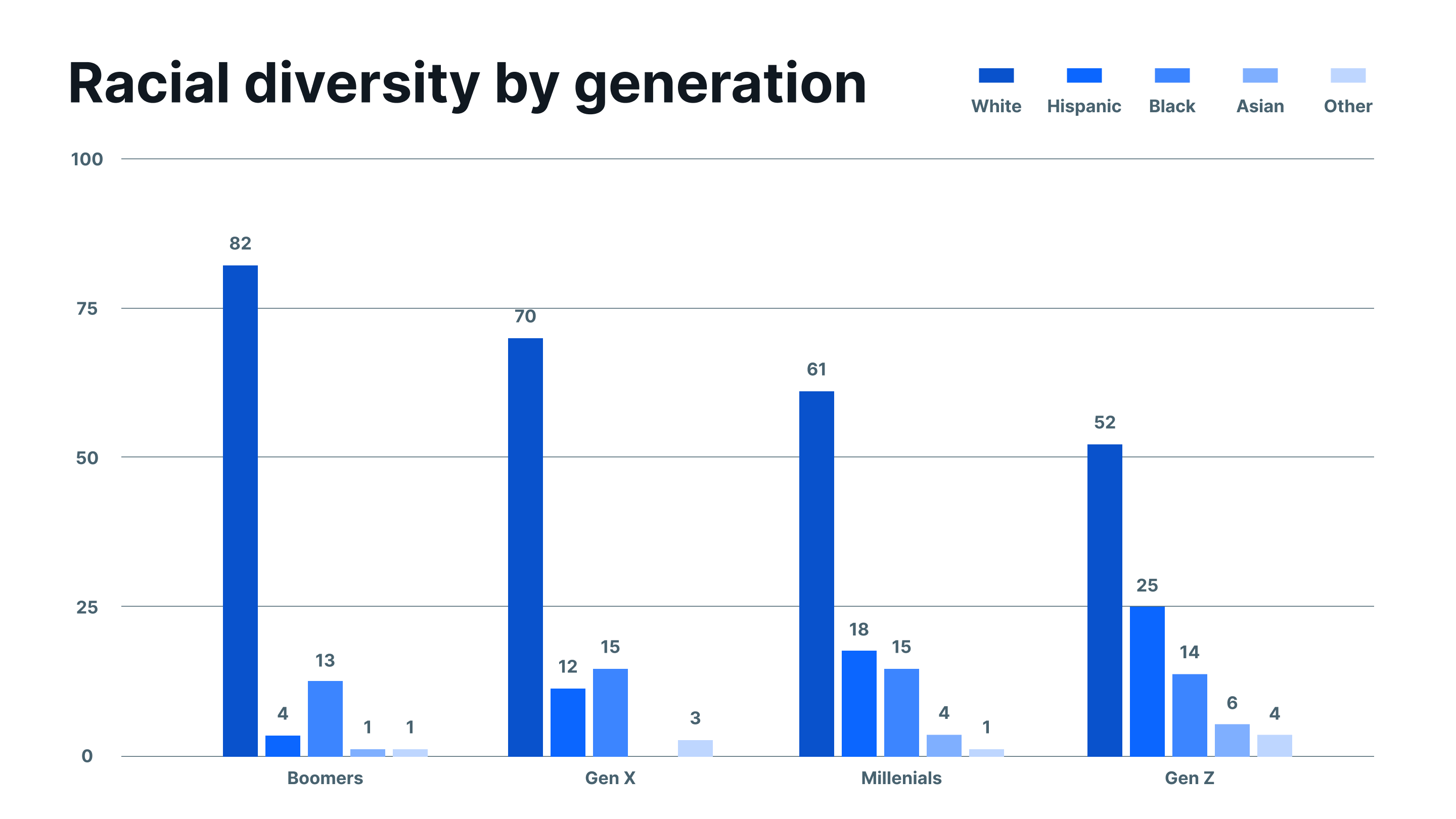
Gen Z comprises the youngest segment of today’s workforce. Of all generations, they may be struggling the most when it comes to remote and hybrid work models.
Overview
Generation Z comprises the youngest and smallest segment of today’s workforce, about 5% of US workers. The oldest of this generation are in their mid-20s and still very early in their careers. The youngest won’t finish high school until 2030.
Because there are relatively few Gen Z workers in the workforce right now, we have less research and data on this segment than Boomers, Gen X, or Millennials. But what we do know about them is fascinating.
Diversity
It’s a striking change from previous generations, with 1 in 4 Gen Z identifying as Hispanic, and the combined number of Black, Asian, and Hispanic minorities almost equaling the number of White members of Gen Z.
Gen Z is also the first generation in which White Americans will no longer have a pronounced majority. In fact, minorities make up 48% of Gen Z, more than double the number of minorities among Boomers and up significantly from both Gen X and Millennial generations.

Source: Pew Research Center
What this means is that diversity, multiculturalism, and inclusion initiatives are likely to take increasingly important roles in workforce development as the most diverse workforce in American history takes shape. What that will look like in a hybrid or remote work environment remains to be seen.
Digital natives
Gen Z is notable for another reason, and that is their status as the true digital natives. These are people who were born after the advent of the internet and who have (in large part) had access to mobile technology and social media all their lives, and who are accustomed to rapid technological innovation. This quality in particular positions Gen Z workers to wield tremendous influence as the citizen developer and no code movements gain become more important.
Early research indicates that these digital natives have a complicated relationship with technology. Although technologically fluent, they are also aware of its risks and drawbacks. Gen Z may also prioritize face-to-face interactions with co-workers because they understand the limitations of technology and social media for building relationships and establishing rapport. According to researchers at Concordia St. Paul, Gen Z take a nuanced view of technology:
- 60% concerned that social media is too public
- 50% spend at least 10 hours a day using an electronic device
- 49% agree that social media is an important part of their life
- 40% want daily interactions with their boss
Pandemic experience
When it comes to the post-pandemic workforce, Gen Z appears to be struggling more than any other segment. In their 2021 Work Trend Survey, Microsoft found that “Gen Z is at risk and will need to be reenergized” and notes that 60% of workers between the ages of 18 and 25 say they are “merely surviving or flat-out struggling right now.”
The hardships felt by Gen Z workers may be attributed to a couple factors. First, Gen Z workers are more likely to be single and new in their jobs. That means they may have less interpersonal support, feel lonelier, and lack a sense of job security or even just a sense of belonging. All of these experiences can have an impact on overall well-being.
Second, Gen Z workers may not have the financial resources to acquire the tools needed for remote or hybrid work, or to create an appropriate home office space. Keep in mind that Gen Z has seen a disproportionate effect on their employment: according to the Center for Generational Kinetics, 45% have seen work hours decrease, while 37% have been unable to work at some point during the pandemic. This same report found that 34% of Gen Z workers want better tools for working remotely.
Perhaps most importantly, Gen Z workers have less work and life experience from which to draw upon, and that may make the pandemic experience more daunting for them than for older generations.
Outlook: The innovators
Generation Z may have a more difficult time dealing with the after-effect of the COVID-19 pandemic in the short term, but they will emerge from this crisis stronger, wiser, and more resilient than before.
Like any new team member, they will require more support from their coworkers and managers than more seasoned employees, especially in this time of rapid change. This experience will position them to navigate future challenges successfully, as their Gen X and Millennial predecessors learned to do from experiences early in their careers.
Generation Z will bring innovation and transformation to the workforce of the future. They will do this both because of their inherent diversity and multiculturalism, as well as their ability to consolidate technological acumen (and wisdom) with the knowledge and experience they inherit from their Gen X and Millennial mentors.






